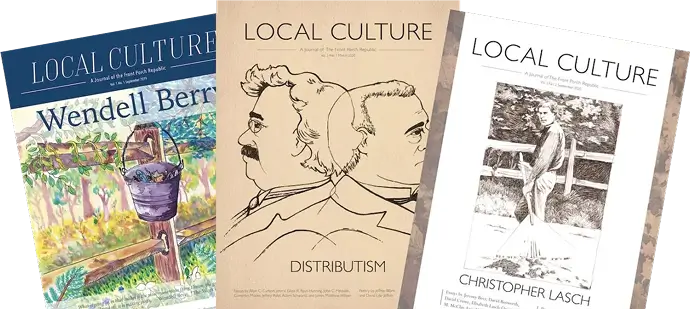politics 61
Beyond the Mechanism: An Economist Grapples with Statesmanship
When we refuse to engage our fellow citizens, we are also taking a public position. There is such a thing as non-partisan economics. But there is no such thing as…
Two Leftists Walk Into a Pandemic . . .
Not only did the worst consequences of lockdowns occur in the Global South, but lockdowns were pushed on the South from the North, through well-known strongarm tactics of neocolonialism that…
Politics Before History
It is an MSNBC segment with pseudo-historical gloss. Billed as a warning to American democracy, it is a simple yet pretentious work that will do nothing to solve the problems…
Seeking a President for the End of the World
For brokenists, the new regime is not just a matter of garden-variety regulatory capture, and “the rules” are just as often a symptom of the problem as a solution to…
We Could Do Worse…
Weak parties are susceptible to extreme candidates who take advantage of party weakness to run shallow, populist campaigns. These people seem fun. They appeal to our political id, mostly in…
The Falconer
A skeptic’s take on such a variety of experience would chalk it up as privileged gonzo larkishness or chest-beating thrill-seeking—an understandable take, one likely partly true. But there was more…
The Smallest of Seeds: A Review of Fragile Neighborhoods
For Kaplan, when comparing two countries and asking why one has succeeded where the other has failed, what matters most is not national policies but “societal dynamics—the strength of the…
Map-Burning
My point is not to get lost in conventional debate here. But seeking to heal from the culture war, I want to uncover the bodies of my neighbors, which industrial…
A Humanist Manifesto of Our Times: A Review of The Soul of Civility
In her introduction, Hudson calls The Soul of Civility “a humanistic manifesto.” And she’s right: the book is steeped in humanism, in more ways than one. First, Hudson underscores the…
The Pantheon of Ancient Wisdom
The liberty and justice which republics are erected to safeguard requires, as Milton and the Founders knew, a moral, virtuous, and religious citizenry. Without this moral and virtuous spirit, the…
Christopher Nolan: Anglo-American Apologist
Pattinson captured the appeal of Christopher Nolan’s movies: “You can either really, really dig into it, find so many different threads to pull, or you can appreciate it as a…
The Ron Paul Effect
What I failed to realize was that the conservatism I was shifting away from was not a historical conservatism at all—rather, it was a distinctly 2000s neoconservatism that I had…
Observing Limits to Re-enchant a Mute World: A Review of The Uncontrollability of the World
Even Rosa the respectable sociologist entertains the possibility that if we relearned how to listen, the mountains might speak. Perhaps they too have their spirits, mute but waiting.
Après Nous, Le Déluge
What keeps me on one side rather than the other is my belief that if we had been living more fully in that real world, a lot of what we…
Rummaging the Word Hord
In order to reconcile competing and hostile cultures in our current, chaotic milieu, it is necessary to forge a politics of honesty and integrity. As hinted by The Wordhord’s emphasis…
Another Option for Christian Politics
With simple elements of bread and wine, the church, then and now, celebrates the memory of Christ’s death by partaking of the sacrament of his body and blood. Ignatius wants…
On Talking About the Weather
Nashville, TN. “If you cannot think of anything appropriate to say, you will please restrict your remarks to the weather.” So says Mrs. Dashwood to her daughter Margaret in the…
Cesar’s Circus
The purpose of politics is to accrue power. Chavez knew this reality, and perhaps his funeral was his last, best opportunity to control the stage and direct the players.
Civic Muscle: A Political Physiology
Civic muscle describes a citizen-centered democracy, where citizens themselves, viewed as agents of change and not mere voters, assume much of the responsibility for the quality of our public life.
The False Promise of Natural Law Liberalism
Evans, GA. Christian authors have been proclaiming the death of Christendom since at least 1989, when Stanley Hauerwas and William H. Willimon made such an announcement in Resident Aliens. Thirty…
Learning about Food and Proper Nouns
Berry moves the conversation from common nouns to proper ones and implicates us all in something deeply practical and doable, yet inexplicably difficult: to love our neighbor, the person right…
Power, Friendship, and a Better Set of Democratic “Rules”
For those tired of the fake news and play hate, who are convinced by Austin and their own better natures that accomplishing something better is actually still possible within the…
The Cornhusker Berryian: Ben Sasse’s Argument for Rootedness
It was said of the late Senator Daniel Patrick Moynihan (D-NY) that he had written more books than most senators had read. Senator Ben Sasse (R-NE) seems to aspire to…
Restoring Trust in the Aftermath of Anti-Social Media
We should all be grateful to Siva Vaidhyanathan. He has endured great pain and suffering to explore a dangerous new landscape, and he now offers to be our guide to…

















